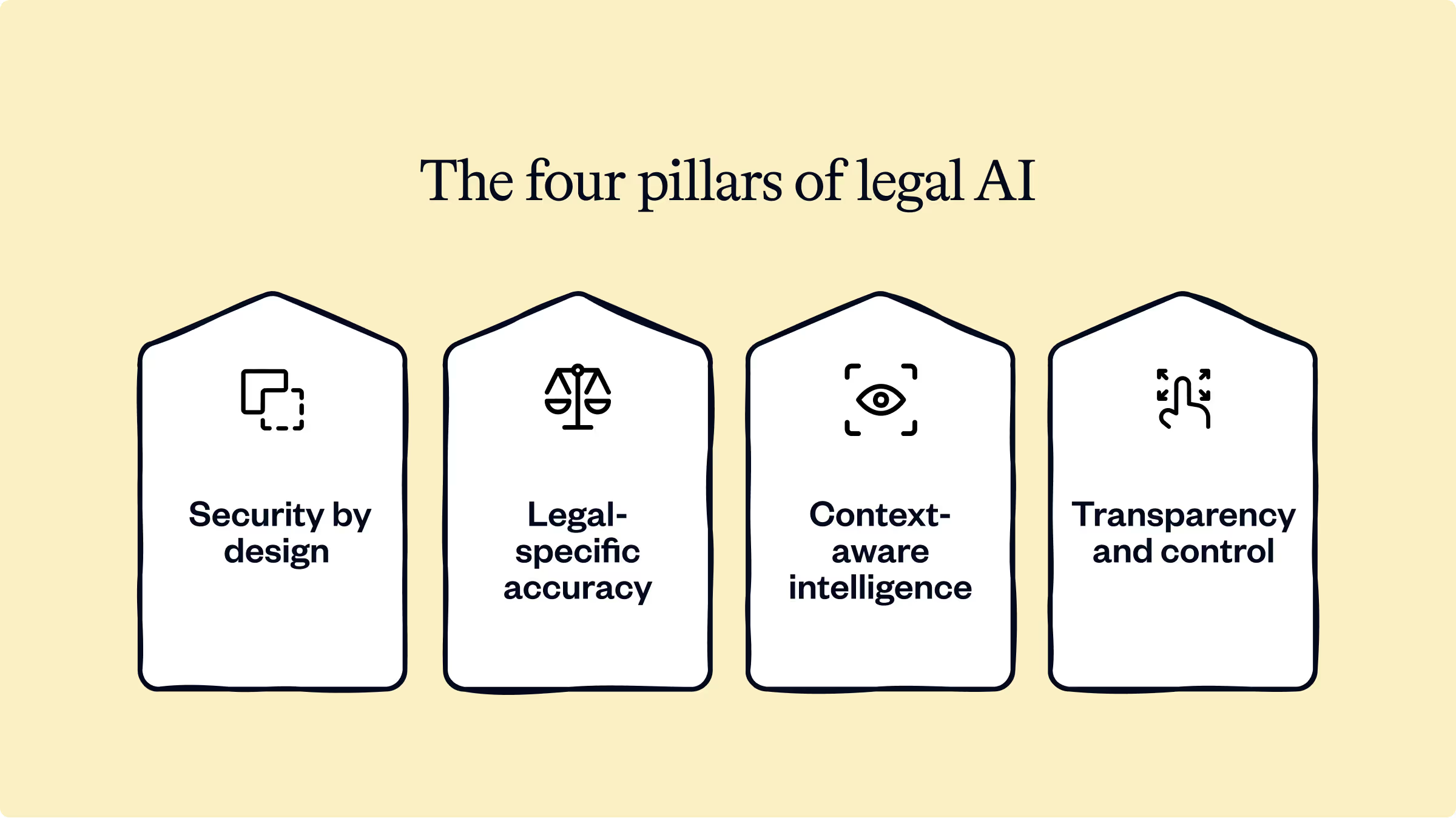Here's a startling contradiction: while AI transforms every other business function, research suggests only 4% of consumers would trust AI to handle legal work independently.
Legal teams aren't rejecting AI; they're rejecting AI that doesn't meet their unique requirements. And after conversations with over 50 in-house legal leaders, we've identified exactly why general-purpose AI falls short and what legal AI software specifically designed for contract management actually delivers.
The trust problem is real
Legal work has zero tolerance for "approximately right."
While marketing celebrates 80% accuracy from AI, for in-house legal teams, 80% accuracy means someone might get sanctioned. The stakes are fundamentally different when comparing AI contract analysis to general business applications.
A 2024 Stanford study found that large language models hallucinate at least 75% of the time when answering legal questions. Recent cases of lawyers being sanctioned for submitting AI-generated fake cases aren't outliers—they're predictable outcomes when general AI meets legal precision requirements.
The stakes are different in legal work. A misinterpreted contract clause can cost millions. A missed compliance requirement can trigger regulatory action. An incorrect legal opinion can destroy business relationships. This is why contract automation software must be purpose-built rather than adapted from general AI platforms.
Why legal teams are right to be skeptical of general AI
Here's what should terrify every legal professional: ChatGPT chat history is accessible and reviewable by ChatGPT employees.
Attorney-client privilege isn't a nice-to-have—it's the foundation of legal representation. Using public AI platforms could "effectively waive attorney-client privilege" by disclosing confidential information to unauthorized third parties.
The problems run deeper when comparing legal AI vs ChatGPT:
Cross-contamination risks: Public AI models could repeat information from one client's query to another client's response.
Training data concerns: Today's confidential input becomes tomorrow's training material, potentially surfacing in future interactions.
Regulatory scrutiny: State bars are issuing guidance emphasizing lawyers' fundamental duty to maintain confidentiality when using any AI platform.
Our research revealed significantly higher comfort levels among legal teams when considering AI tools for in-house legal teams from established legal technology providers compared to general-purpose platforms.
Legal teams aren't just buying AI capabilities—they're buying confidence that their vendor understands the stakes of legal operations efficiency.
General AI doesn't know your legal universe
Even if accuracy and confidentiality were solved, general AI would still miss the mark. Legal work isn't about applying generic legal knowledge—it's about understanding your specific context through contract intelligence platforms.
The internal knowledge gap
We identified what we call the "unlimited storage paradox"—legal teams have vast amounts of institutional knowledge but struggle to find relevant information efficiently. This is where legal document automation and AI-assisted legal research become critical.
General AI can't tell you:
- How your company negotiated similar clauses before
- What your CFO's risk tolerance is for this liability
- How this contract fits your broader commercial relationship
- Whether your insurance covers this particular risk allocation
The workflow integration problem
Legal work happens within complex business processes involving contract lifecycle management AI, matter management, and approval workflows. General AI operates as a standalone tool, forcing legal teams to extract information, process it externally, then re-integrate insights back into their systems.
Our analysis found that legal teams' biggest frustration isn't a lack of general legal knowledge—it's the fragmentation of information across multiple systems and the manual effort required to synthesize context. This is exactly what legal workflow automation addresses.
What purpose-built legal AI actually looks like
Understanding general AI's limitations clarifies what legal teams need: legal technology solutions designed specifically for legal requirements, not adapted general-purpose AI.

The four pillars of legal AI
1. Security by design
Security is one of the cornerstones for any enterprise legal AI tool. When it comes to legal work, security concerns are heightened owing to the volume of critical and sensitive information legal teams work with. What makes legal AI software trustworthy includes these key security parameters:
- Cloud deployment with enterprise-grade encryption so that your data is never compromised
- Zero-retention policies ensuring your data never becomes training material for AI models
- Granular access controls respecting attorney-client privilege, ensuring no one outside of key stakeholders gets access to sensitive information
- Regulatory compliance AI frameworks designed specifically for legal requirements
2. Legal-specific accuracy
- Training on authoritative legal sources, not general internet content. Purpose-built legal AI solutions tap into context-relevant legal resources to deliver optimal resolutions for your queries
- Understanding of legal hierarchy, precedent, and jurisdiction through natural language processing legal capabilities.
- Domain-specific fact-checking with clear source attribution
- Validation capabilities that meet legal standards for contract risk assessment AI
3. Context-aware intelligence
- Integration with internal legal systems and contract databases through CLM platform with AI capabilities
- Understanding of company-specific policies and risk tolerance
- Machine learning contracts analysis that learns from past decisions while maintaining confidentiality boundaries
- Legal team productivity tools that respect established legal processes
4. Transparency and control
- Clear reasoning and sources for every recommendation through contract analytics software
- Human oversight capabilities with appropriate escalation
- Comprehensive audit trails for compliance
- Customizable confidence thresholds aligned with risk tolerance
Real-world applications:
This enables applications that generic AI cannot support through AI-powered contract review capabilities.
Contract Intelligence: AI contract negotiation tools that understand your standards and suggest language based on successful past agreements.
Risk Assessment: AI incorporates your risk tolerance, past decisions, and industry benchmarks for contextualized analysis.
Legal Research: AI-assisted legal research combines general research with internal precedents and institutional knowledge.
Workflow Automation: Automated contract drafting understands your approval processes while respecting legal workflows.
The strategic imperative
The urgency is real. Recent research shows 96% of general counsels had budget cuts in 2024, while 81% report inadequate staffing. Meanwhile, 58% identify increased efficiency as their primary goal—exactly what contract management software for lawyers delivers.
Legal teams must deliver more value with fewer resources. Those delaying AI adoption risk falling behind not just in efficiency, but in strategic business value.
The competitive advantage goes to teams that choose purpose-built legal AI. These legal technology solutions don't just automate tasks—they enable lawyers to focus on high-value counsel and business partnership activities.
However, the window of opportunity to influence AI development is limited. Legal teams engaging with enterprise contract AI software can now shape tools that truly meet their needs. Those who wait may find themselves choosing from solutions designed for other priorities.
The bottom line
The question isn't whether legal teams should adopt AI—it's whether they'll choose AI tools for in-house legal teams built for their requirements or settle for general-purpose solutions that compromise on security, accuracy, and context.
Legal teams that thrive in the AI era will be those demanding more from their AI tools and choosing partners who understand that legal work requires legal technology solutions specifically designed for legal professionals.
The future isn't about replacing lawyers with AI—it's about empowering legal professionals with AI that understands their world.
That future starts with choosing the right AI partner today.


.avif)



.avif)


